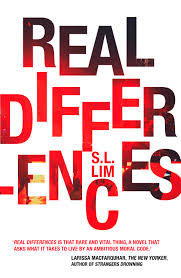Real Differences (Transit Lounge 2019) by S.L. Lim dives deep into the existential angst of millennials and explores questions about disaffection, familial expectation, ambition, friendship, religious fervour, privilege, race, morality and radicalism. It is a novel that expects its readers to engage in some thought-provoking conversations around confronting their biases and assumptions of class, culture, ethnicity and status.
I have mixed feelings about this book. Firstly, I didn’t find the cover particularly appealing, and this is disappointing, because it put me off starting the book for a while. But then once I began reading, I immediately thought of Sally Rooney’s Normal People – this novel has that same feel about it, of young adult friendships growing into people in their twenties and thirties and still experiencing the tug of past ties. I didn’t find Real Differences nearly as compelling as Normal People, but admittedly that is a high bar – certainly if you enjoyed that book, this one may resonate with you. But I continued to have mixed feelings throughout the book. Sometimes I feel it delved too deep into navel-gazing, philosophical questions that slowed the narrative. At other times, I would suddenly read a sentence or a paragraph that shocked me with its pure, razor-sharp brilliance. I wanted to copy down these flashes of inspiration so that I would remember them. And then the book would slow again, for me anyway, and I would find it difficult to stay connected.
So what is my verdict? Well, I feel perhaps that this is a young and upcoming author who is still finding her voice and exploring the best way to confront the many questions she has about life. The novel is ambitious in its scope, as if Lim is using the story to navigate many different issues. I found it difficult to remain engaged throughout; but then, as I said, there were moments of focussed inspiration that stopped me in my tracks.
The story is about friendship and family, told from the perspectives of several characters. Nick has grown up with the advantage of white privilege. His best friend Andie, the daughter of Indo-Chinese refugees, is on a mission to change the world and fight poverty through the organisation for which she works, Real Difference. Andie’s husband Ben is white and their conflict about race and culture and class is a constant niggle to their relationship. Andie’s cousin, Tony, still only a teenager, is the focus of his parents’ high expectations, and finds his own path through radicalisation. I did find the delineation of the characters somewhat confusing at times, particularly towards the end of the book where we hear from more than one character’s perspective in the same chapter, sometimes changing from paragraph to paragraph. I’m not sure if this was deliberate on the part of the author, but if so, I’m not sure it worked – I found it a bit discombobulating.
But despite some criticisms of this book, I still kept reading. I did care about the characters and what happened to them. And as I noted, there were occasional flashes of brilliance – of observation or philosophical inquiry or thoughtfulness – that immediately switched me back on again.
And the messages or themes underpinning the narrative are compelling: an examination of racism and sexism, of cultural and gender issues, of the solace and the danger of radical religious beliefs, the divide between rich and poor, the argument of refugees versus economic migrants. Lim deftly depicts the insidious nature of sly racist comments that are not meant to hurt (‘because some of my best friends are Asian’) but that nevertheless cut to the quick. She states some uncomfortable truths and probes some pressures of traumatic family histories and upheavals. I suspect that for a particular audience, the characters and the family difficulties they face will resonate strongly. And the conclusion or climax is shocking and unexpected.

